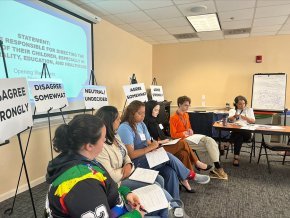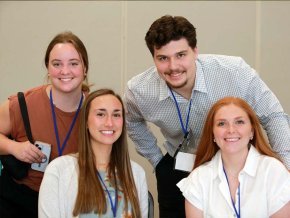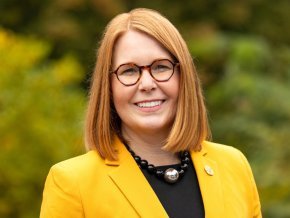
Building community through conversations
In a time when divisions over social issues feel more pronounced than ever, students at Lenoir-Rhyne University are sharing the value of discussion, collaboration and discourse through the North Carolina Student Dialogue Ambassadors (NC-SDA) program, sponsored by North Carolina Campus Engagement (NCCE).

“We’re creating a space that is about collaborating, not debating,” said Sahar Sana ’25, a project management and business analytics major selected as a student ambassador for LR. “It’s setting up a dialogue about topics you might not talk about otherwise. It’s about listening to other people instead of just making your own point. When you’re not looking at the other person as an opponent, you can see how their opinion can add value to what you think about these topics.”
Statewide the program mobilizes student leaders passionate about bridging divides by training a cohort of students – ambassadors – in the skills to engage in deliberation and dialogue on critical issues facing North Carolina. Lenoir-Rhyne is one of three universities selected to participate in the program this year. After Student Dialogue Ambassadors receive training, they host a minimum of four dialogues and one dialogue facilitation training for fellow students on campus. Participating NC-SDA campuses select two students to serve as Student Dialogue Ambassadors, plus a faculty or staff mentor to provide support.
“The topics are challenging but creating the space to have those hard conversations without feeling the pressure to solve anything, that’s the most important piece,” said staff mentor Casey Stafford, director of student involvement and leadership.
At LR, Sana and fellow ambassador Dan Paradis ’24, an economics major, completed a two-day intensive dialogue and deliberation training with NC Campus Engagement during the fall 2023 semester. They began hosting dialogues in February 2024, starting with a conversation about affordable housing, a highly relevant topic to young adults living on their own for the first time either in college or immediately after.
“These discussions are about surveying the landscape around an issue,” said Paradis. “There’s no expectation of prior knowledge. It’s more about sharing thoughts and feelings than demonstrating expertise, and we create a safe and structured environment to ensure everyone is heard and valued.”
The dialogues can use any one of four models for dialogue and deliberation. The models and their sources are Civil Dialogue (Arizona State University), Braver Discussions (Braver Angels Alliance of Central NC), Deliberative Dialogue (National Issues Forum Institute) and Living Room Conversations.
The discussions begin with participants getting to know one another through questions about purpose and values, and they end with a reflective question about what participants are taking away from the conversation.
“Everyone gets to talk as much as they want to in these conversations, and we get to see each other as people, without distractions or assumptions,” said Sana. “What really leads to creating the safe space is giving people time to think before they talk. They all have time to speak and share, but they have the ability to shape their thoughts first. We don’t always give ourselves or others that kind of space, and it makes a difference in our communications and connections with each other.”
Three more student dialogue sessions are scheduled for March 12, March 18 and April 2. Each of these will be held from 6:30 to 7:30 p.m. in room 161 of the Rhyne Building. Later in April, Paradis and Sana plan to hold a training session for ambassadors to facilitate future dialogues.
“A lot of our social interactions can be very shallow, especially online, and I think these discussions are refreshing to people who are used to that kind of superficial discourse,” said Paradis. “A lot of people feel like they’re different from everyone else, but we all have more common ground than we think. Getting out of the black-and-white mindset and connecting, that’s small but powerful. We should do the things we can, even in small ways, to make our campus, our state, our country better.”

Lenoir-Rhyne University students showcased their academic excellence and research expertise at the 2025 North Carolina Academy of Science (NCAS) annual meeting in late March.
View More
Lenoir-Rhyne University has selected Summer McGee, Ph.D, as the institution’s 13th president. Her appointment was enthusiastically approved by the Lenoir-Rhyne Board of Trustees after a national search.
View More